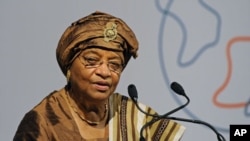Liberian voters made history five years ago by electing Africa's first female president. But as Ellen Johnson-Sirleaf runs for re-election, voters will find few female candidates on ballots for other posts.
Liberia's Elections Commission is encouraging more women to run for elected office in a country where they make up less than 15 percent of the legislature.
Elections Commission trainers have met with women across Liberia about standing as party candidates for local and national office. Elections Commission chairman James Fromayan says the first obstacle is often political parties themselves.
“We try the best we can to appeal to political parties to begin with at the regular meetings with those parties to encourage women participation in the party at the executive committee level," he said. "You can't have an executive committee of sometimes 30 persons and just about two women. That is just not proper.”
Many obstacles
Fromayan says President Sirleaf's election raised the profile of female candidates but Liberia has not seen their numbers grow as quickly as he anticipated.
“We can't just lay back and say well, we have a female president. As laudable as that is in Africa, the first, but we need to go beyond that. That should even serve as an impetus, as a means through which other younger women can say let's join politics. If Ellen Johnson-Sirleaf can make it, then we can also make it,” said Fromayan.
"Not many women are educated which lets them have that fear of partaking into politics. The husband may say that, 'I do not want for my wife to run in election.' And that is actually a problem,” says Korto Jallah Socree, an opposition candidate for a legislative district in Montserrado County.
Socree says there are still few women in positions of decision-making despite President Sirleaf's election.
“For the very few who have come out to put their hands up, they are under threat maybe by the community or by their male counterparts,” said Socree.
Lack of support
She adds that political parties do not give female candidates the same financial support as male candidates.
“They expect you to raise your own money because they don't even want you to be an antagonist to them, so they make it difficult for you to raise money,” she said.
Like Socree, most female candidates come from areas around the capital, Monrovia. So the London-based peace building group International Alert is focusing on candidates from more remote areas with training on how to run campaigns, deal with the media, and raise money.
“It is important that people outside Monrovia will also be a part of the transformation, said Jackson Speare, who directs Liberia programs for International Alert. "Gone are those days that women are not considered part of the national development. Women must be.”
Changing perceptions
Speare says President Sirleaf's reputation as the “Iron Lady” of Liberian politics has helped.
“People are beginning to challenge the perception that women can not represent them. So that will go a long way to help increase women's chances for election,” he said.
Speare also says the Sirleaf administration has improved the climate for female candidates with progress on issues of gender rights and equality by increasing the maximum sentence for rape, guaranteeing women’s right to property, and opening a special court to try cases of gender-based violence.













